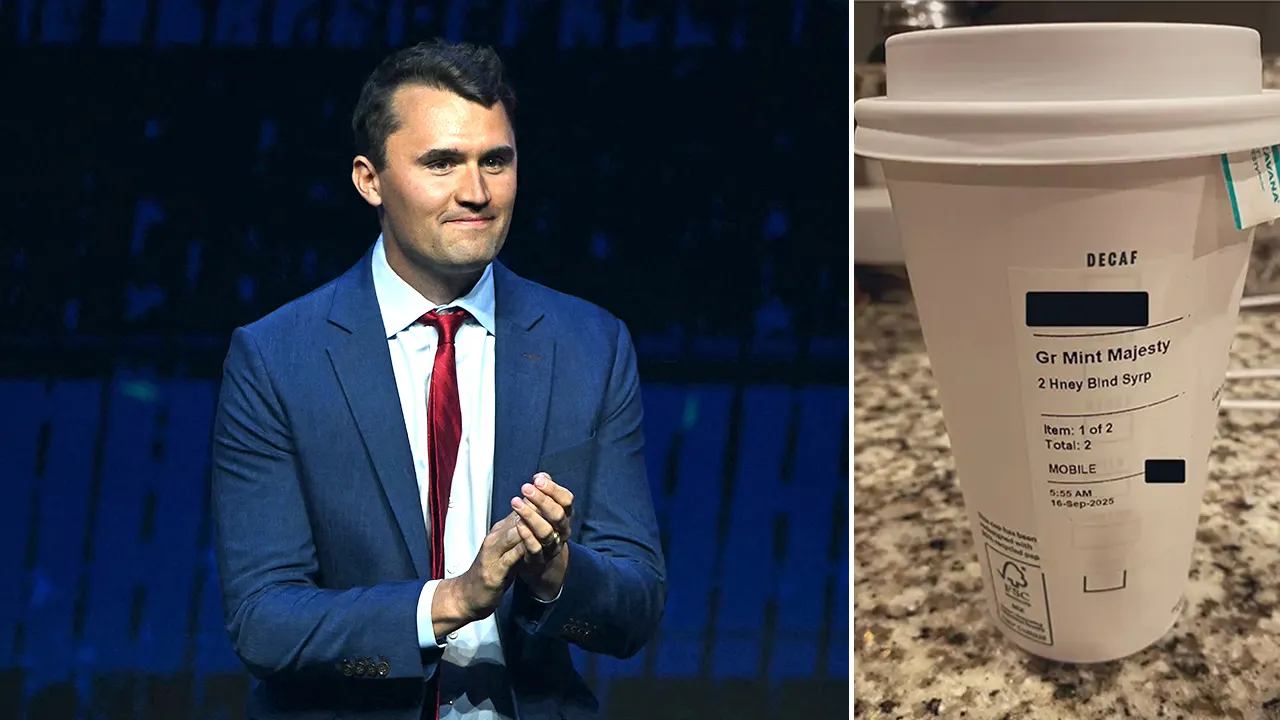A video recently went viral showing a Starbucks barista in Yucaipa, California allegedly refusing to put the name “Charlie Kirk” on a customer’s cup. The customer ordered a Mint Majesty tea with two honeys, asked for the name as “Charlie Kirk,” and was told by the barista that they “don’t honor politics here.”
In the video:
- The barista said, “We can’t do political names, but it didn’t even ask for a name to begin with, so it will be $3.75, OK.”
- When pressed whether the name could be printed, it was claimed that the sticker system “won’t print” “Charlie Kirk.”
- The customer then asked if just “Charlie” could be written; the barista said that might work. But the full name, she said, was viewed as political.
What Starbucks Says

Starbucks responded via a company statement (published in their news section) saying there is no policy that prohibits customers from using “Charlie Kirk” as a name on orders. The company said: “There are no restrictions on customers using Charlie Kirk’s name on their order, and we are following up with our team.” About Starbucks
So: Starbucks claims no official policy, but the barista involved cited “politics” and the claim that the ordering/sticker system would not permit the name in this instance. Fox News
Public Reaction
Reactions have come fast and loud:
- Many users online called for boycotts of Starbucks.
- Social media criticism focuses on the idea that a brand is censoring political speech, or at least, is being inconsistent. People are questioning: are names political? Is refusing to write a name censorship?
- Some people are highlighting how easily a corporation can hide behind alleged policy or “system limitations” to avoid controversy, while still being seen as acting in a political way.
What We Found & What’s Unclear
Here are the facts, and the gaps:
| Fact | Clear from the evidence |
| Barista told customer name “Charlie Kirk” wouldn’t print due to politics | Yes, that is what the viral video shows. |
| Starbucks has no company policy banning “Charlie Kirk” name | Yes, they said publicly there’s no such policy. |
| Public backlash & boycott calls | Yes, definite. |
| System sticker issue (“won’t print”) | Yes, reported in the video. |
| Unclear / Disputed | What’s not confirmed yet |
| Whether refusal was store policy or individual barista decision | Starbucks says there’s no policy; unclear whether barista misinterpreted or system glitch. |
| Whether the “political names” claim is part of any broader internal guideline | Not confirmed. Starbucks denies any general restriction. |
| Whether it was an issue of the sticker system being programmed in a way that filters out certain names | Suggested by the video, but not proven. |
| Potential precedent: whether other names have been refused under similar reasoning | Not documented clearly so far. |
Implications: Corporate Speech, Censorship, & Brand Trust
This incident is more than a viral clip. It taps into bigger controversies around how corporations engage with politics, speech, and consumer expectations.
Corporate Speech & Neutrality
Starbucks claims neutrality in “politics” with this statement that there is no restriction. But when front-line employees claim otherwise, or when customers believe they see political speech being filtered, it shakes that claim. Corporations often say they want to be apolitical to avoid alienating customers. But reality (and perception) is different.
Companies are increasingly forced to respond to social issues whether they like it or not. Refusing to write a name that’s politically associated, even if the person is deceased, or only being honored, can be seen as taking a political stance by omission. Speech by omission is still a kind of speech.
Censorship vs. Moderation
Is this censorship? Or is it moderation? The difference matters:
- Moderation: enforcing rules about content (e.g. no hate speech), protecting users, aligning with policy.
- Censorship: suppression of speech, especially political speech, or ideological suppression.
If the company or system is filtering or refusing “political names,” it may cross from simple moderation into de facto censorship. The question is: who defines “political”? Who gets to decide which names or terms are “political”?
Brand Trust at Stake
For brands like Starbucks, consistency, transparency, and reliability matter a lot:
- Consistency: If Starbucks sometimes allows politically‐charged names and sometimes doesn’t, it will seem arbitrary. That damages trust.
- Transparency: Customers want to know the rules. If rules are hidden, unstated, or misinterpreted, backlash happens.
- Reputation risk: Being seen as suppressing expression, even unintentionally, can lead to boycotts or “cancel culture” responses.
The Broader Context
- Current climate: people are more sensitive to perceived political bias from corporations. With polarized politics, even small actions are amplified.
- Technology and systems: Many companies rely on tech systems (sticker printers, name tags, name fields, automatic printing). If any part of that tech is programmed to block certain names, intentionally or by error, that becomes a political issue.
- Employee autonomy vs corporate policy: Are the employees empowered to interpret rules? Or are they acting independently? Misunderstandings can spread quickly in public perception.
What This Means Going Forward
What should brands, customers, and regulators watch for?
- Clear written policies
- If a brand wants to avoid printing certain politically charged terms, there must be a written, public policy.
- Employees should be trained so that they don’t independently create “rules” that the company doesn’t officially have.
- If a brand wants to avoid printing certain politically charged terms, there must be a written, public policy.
- Transparency in systems
- If system stickers, printing workflows, name input methods are limited, disclose these limitations.
- Let customers know if “certain names” might not print due to tech issues, etc.
- If system stickers, printing workflows, name input methods are limited, disclose these limitations.
- Consistent enforcement
- Don’t let ambiguity lead to arbitrary decisions.
- If a name is refused once, but accepted elsewhere, people will call hypocrisy.
- Don’t let ambiguity lead to arbitrary decisions.
- Listening & communication
- Brand needs to respond to backlash not just with “no policy,” but with meaningful investigation.
- Communicate what happened at that store: was it a misunderstanding, mistake, or isolated issue?
- Brand needs to respond to backlash not just with “no policy,” but with meaningful investigation.
- Regulatory scrutiny and speech law
- In many places, laws protect free speech differently. There’s growing interest in how private companies moderate speech or “silence” political expression. Customers may expect legal or regulatory bodies to hold companies accountable.
- In many places, laws protect free speech differently. There’s growing interest in how private companies moderate speech or “silence” political expression. Customers may expect legal or regulatory bodies to hold companies accountable.
The Starbucks & Charlie Kirk name incident shines a spotlight on the thin line between corporate policy, customer perception, and free speech. What started as a simple request, to put “Charlie Kirk” on a coffee cup, has morphed into a debate over censorship, neutrality, and what customers expect from brands.
What we know for sure: Starbucks denies any policy banning political names; a video shows a barista refusing that name citing politics; people are upset; brand trust is being questioned. What remains uncertain: whether this was a systemic decision or mistake; how widespread this kind of refusal might be; whether Starbucks truly has safeguards to prevent employee overreach.
For customers, this is a moment to ask: Are companies really neutral? For brands, it’s a moment to ensure that their public image, internal policies, and on-ground behavior all align.

















I not to mention my friends happened to be examining the good recommendations from your site and the sudden I had a terrible suspicion I had not expressed respect to you for those techniques. These guys came warmed to learn them and have extremely been loving these things. I appreciate you for turning out to be considerably kind and then for finding variety of important resources most people are really desperate to be informed on. Our honest apologies for not expressing gratitude to earlier.